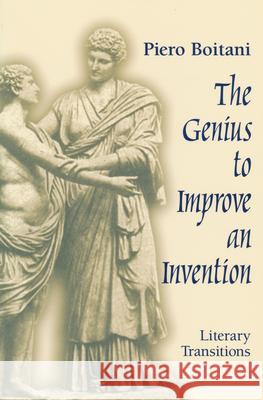Genius to Improve an Invention: Literary Transitions » książka
Genius to Improve an Invention: Literary Transitions
ISBN-13: 9780268029500 / Angielski / Twarda / 2002 / 168 str.
Genius to Improve an Invention: Literary Transitions
ISBN-13: 9780268029500 / Angielski / Twarda / 2002 / 168 str.
(netto: 387,15 VAT: 5%)
Najniższa cena z 30 dni: 401,54
ok. 22 dni roboczych.
Darmowa dostawa!
"The Genius to Improve an Invention" derives its title from John Dryden s phrase for the British tendency to take up literary masterpieces from the past and perfect them. Distinguished literary scholar Piero Boitani adopts Dryden s notion as a framework for exploring ways in which classical and medieval texts, scenes, and themes have been rewritten by modern authors.Boitani focuses on a concept of literary transition that takes into account both T.S. Eliot s idea of tradition and individual talent and Harold Bloom s anxiety of influence. In five elegant essays he examines a wide range of authors and texts, including Aeschylus, Sophocles, Euripides, Shakespeare, Chaucer, Voltaire, Goethe, Sartre, Dante, and Keats. Appearing for the first time in an English translation, "The Genius to Improve an Invention" will appeal to anyone interested in the Western literary tradition. "The Genius to Improve an Invention" is both substantial and graceful a fascinating journey through some of the greatest works of Western literature, with a guide who is at once learned and entertaining, impassioned and moving. Jill Mann, University of Notre Dame This book deserves the attention of all who are interested in the processes of literary continuity and change. Frank Kermode, King s College, Cambridge University "The Genius to Improve an Invention" is supported with a thorough theoretical awareness and a flexible intelligence enabling Boitani to move comfortably within a vast array of texts and thus take the reader on a fascinating literary journey. Through his pressing and detailed argumentations, the author suggests original approaches to some of the great works of European literature each of them is considered as a solution to a specific problem and, at the same time, as a probative argument in favor of applied rationality. Reading these essays calls to mind what Henry James once said, all the pieces of the game are] on the table together and each unconfusedly and contributively placed, as triumphantly scientific. Mario Lavagetto, University of Bologna"











